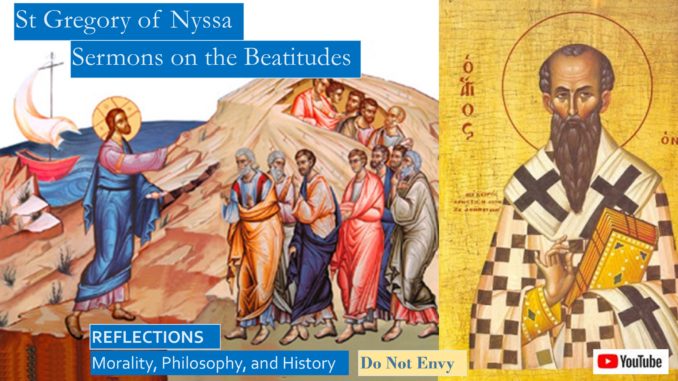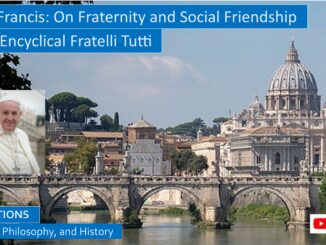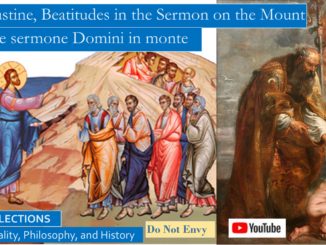
St Gregory of Nyssa views the Beatitudes as a Ladder of Divine Ascent to the heavens. The next rung in the ladder is:
Blessed are the meek, for they shall inherit the land.
Who are the meek? Why would someone choose to be meek?
St Gregory of Nyssa, Beatitudes, Blog 2, Blessed are the Poor in Spirit
http://www.seekingvirtueandwisdom.com/st-gregory-of-nyssa-beatitudes-blog-2-blessed-are-the-poor-in-spirit/
There are many occupations, primarily the helping occupations, such as those blessed to be teachers or nurses or social workers where meekness and humility are not that incompatible with the responsibilities of the job. But for those of us who unfortunately have chosen a more ruthlessly competitive occupation in business where a profit must be made, or worse as a soldier, the capitalist corollary to this Beatitude might be:
Blessed are the meek in business and battle not so much, for they shall be toast.
YouTube video for Blogs 2 – 5: https://youtu.be/xaqFTPgoDI0
YouTube script for more book links: https://www.slideshare.net/BruceStrom1/st-gregory-of-nyssa-on-the-beatitudes-and-the-commandment-do-not-envy
The only possible answer to this dilemma is not to ignore that it exists, but to face it and live a godly life as best you can, realizing there living a life in a sinful world means facing hard decisions and moral dilemmas. Jesus realizes this in another puzzling passage when he sends his disciples out to spread the Word:
“See, I am sending you out like sheep into the midst of wolves; so be wise as serpents and innocent as doves.”
What does it mean to be wise as serpents? What does it mean to be meek? How can you be both?
We will not try to answer these puzzling questions now. Here we will simply permit St Gregory of Nyssa to teach us how he seeks the meaning of meekness.
The translator in footnote 21 notes that the Greek word for meekness can also mean slowness or sedateness. St Gregory of Nyssa has this second meaning in mind when he teaches, “There is a great tendency towards evil in nature, which is quick to turn toward the worse.” But, “the habit that gives way to these evil downward impulses only slowly and with difficulty is called meekness.” Meekness is like the love of St Paul that does not rejoice in wrongdoing but rather rejoices in the truth.
St Gregory of Nyssa mentions envy in this discourse. “Man’s character is divided into opposite impulses. Wrath is opposed to gentleness, arrogance to modesty; envy to wishing people well, and hate to a loving and peaceable disposition.”
St Gregory of Nyssa teaches, “Blessed are those who are not easily turned towards the passionate movements of the soul, but who are steadied by reason.” “To boast of riches or to be proud of one’s family, to have regard to fame and to think oneself above one’s neighbor, all these human honors destroy and shame the honor of the soul. No righteous man would thus defile the purity of his soul. When humility is well established, wrath will find no entrance into the soul. If there is no wrath, our life will be in a settled state of peace. This is true meekness.”
BLESSED ARE THOSE WHO MOURN
The next rung of the ladder of the Beatitudes reads, “Blessed are they that mourn, for they shall be comforted.”
St Gregory of Nyssa observes, “If one looks at this from the point of view of the world, you would say that these words are ridiculous, and argue like this: If one calls blessed those people whose life is spent enduring all manner of misfortune, it follows that those who live without sorrow or care must be miserable.”
To explore further what he means, let us try adding a little word and see how this verse reads: “Blessed are they that mourn selfishly (oh woe is me!), for they shall be comforted.”
This doesn’t work at all, for it is like saying, “Blessed are those who complain,” and who would call complainers blessed? They are not any fun to be around, they are not friendly, most people avoid complainers when they can. The Church Fathers teach us that it is unwise to complain, we should rather look for the best in our neighbor.
So let us try the opposite: “Blessed are they that mourn selflessly, for they shall be comforted.”
This sounds better, for we should mourn for our neighbor’s misfortune, we should wince when our child makes wrong choices and goes down the wrong paths, we should be sad when our loved ones destroy themselves with drink and drugs and addictions. When we truly love our neighbor as ourselves we will mourn for our neighbor’s misfortunes, whether they be caused by chance or by choice.
Let us explore how St Gregory of Nyssa ponders this Beatitude. Our saint echoes St Paul, “there is more than one kind of sorrow, the sorrow of the world and the sorrow brought about by God. The work of worldly sorrow is death, whereas the sorrow brought about by God works in those afflicted with repentance who desperately seeks salvation. For surely, if a soul bewails its wicked life because it feels its bad effects, such suffering cannot be excluded from the sorrow that is called blessed.”
“As the Apostle says, if people indulge in a life of sin because they no longer feel pain, they have become truly paralyzed and are dead to the life of virtue, for they have no feeling for what they are doing.” This reminds of the Catholic distinction of mortal versus venial sins, mortal sins are those sins that damage our ability to Love God and to love our neighbor.
We can see that St Gregory of Nyssa is not following my proffered interpretation, he is not saying that this verse exhorts us to mourn for others, but that we should be mournful of our own sinfulness and imperfection. Indeed, our saint is hinting that it is okay to be selfish in our walk with the Lord in one respect, that we can be selfish we seek our salvation, our improvement, our increasing Love for God, we should seek to accumulate as much godliness and goodness as our spiritual barns will hold, we should seek ever greater propensity to live as godly a life as we can live. We should mourn for our transgressions, for our imperfections, for our many failings as we futilely try to live a godly life.
St Gregory of Nyssa teaches, “If a man has been able to perceive the true good, and then realizes the poverty of human nature, he will certainly think the soul is in distress. For he will consider that the present life is spent in sorrow, because it is removed from this true good.”
St Gregory of Nyssa, Beatitudes, Blog 4, Blessed are the clean of heart and the merciful
http://www.seekingvirtueandwisdom.com/st-gregory-of-nyssa-beatitudes-blog-4-blessed-are-those-who-do-not-envy/
“When Jesus calls mourning blessed, the underlying sense seems to be that the soul should turn to the true good and not immerse itself in the deceits of this present life.”[1]
We should mourn when are not the persons whom God wants us to me, for as God mourns when we stray or fall short of the mark, so should we mourn.
[1] St Gregory of Nyssa, “On Beatitudes,” Sermon 2-3, in The Lord’s Prayer, the Beatitudes, translated by Hilda C Graff, (New York: Paulist Press, 1954) pp. 96-116.





3 Trackbacks / Pingbacks